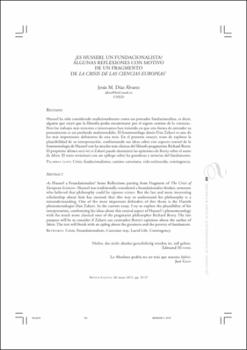¿Es Husserl un fundacionalista? Algunas reflexiones con motivo de un fragmento de "La crisis de las ciencias europeas"
Autor
Díaz Álvarez, Jesús M.Fecha
2011Resumen
Husserl ha sido considerado tradicionalmente como un pensador fundacionalista, es decir, alguien que creyó que la filosofía podía encaminarse por el seguro camino de la «ciencia». Pero los trabajos más recientes e interesantes han insistido en que esta forma de entender su pensamiento es un profundo malentendido. El fenomenólogo danés Dan Zahavi es uno de los más importantes defensores de esta tesis. En el presente ensayo, trato de explorar la
plausibilidad de su interpretación, confrontando sus ideas sobre este aspecto central de la fenomenología de Husserl con las mucho más clásicas del filósofo pragmatista Richard Rorty. El propósito último será ver si Zahavi puede desmentir las opiniones de Rorty sobre el autor de Ideen. El texto terminará con un epílogo sobre las grandezas y miserias del fundamento «Is Husserl a Foundationalist? Some Reflections parting from Fragment of The Crisis of
European Sciences». Husserl was traditionally considered a foundationalist thinker, someone
who believed that philosophy could be rigorous science. But the last and more interesting
scholarship about him has insisted that this way to understand his philosophy is a
misunderstanding. One of the most important defenders of this thesis is the Danish
phenomenologist Dan Zahavi. In the current essay, I try to explore the plausibility of his
interpretation, confronting his ideas about this central aspect of Husserl´s phenomenology
with the much more classical ones of the pragmatist philosopher Richard Rorty. The last
purpose will be to consider if Zahavi can contradict Rorty’s opinions about the author of
Ideen. The text will finish with an epilog about the greatness and the poverty of fundament.





